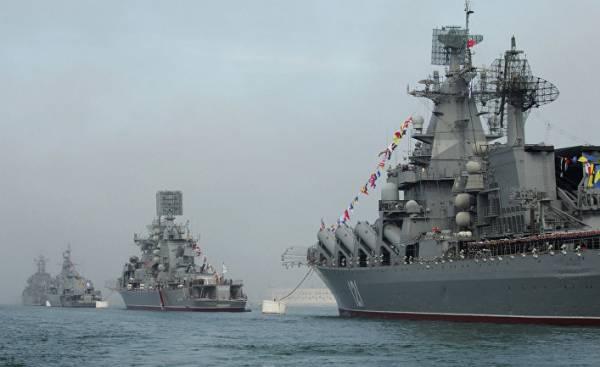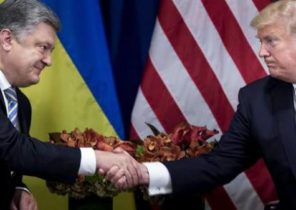
At the summit in Warsaw on 8 and 9 July 2016, member countries of NATO decided to deploy military assets to the Baltic States, Poland and (to a lesser extent) Romania. The purpose of all this is to repel Vladimir Putin, who is now inspired by the annexation of Crimea and taking control of parts of Donbas, of the thought of the beginning of the hybrid war in the North-Eastern flank of the Alliance. Calibrated the NATO presence in the Baltic States should dispel any uncertainty.
At the same time, the Romanian proposal to host the NATO fleet in the Black sea did not receive support. At a meeting in Brussels on 15 and 16 February, the Council will consider opportunities to expand the guarantees are on the Black sea coast allies. Anyway, until now Turkey has kept NATO at a distance, preferring to act jointly with Russia. Tactical game and the beginning of summer the Russian-Turkish rapprochement towards the status quo.
Geostrategic importance of the Black sea
However, the allies should not have to downplay the strategic importance of the Black sea. It is a sea area of 450 thousand square kilometers is located between Eastern Europe, the Balkans, southern Russia, the Caucasus and Asia Minor, and also opens the way to the Mediterranean through the Turkish Straits. The collapse of the Soviet Union was a serious blow at the Maritime presence of Russia and its capabilities in the Mediterranean, and the rent at the Ukrainian base in Sevastopol could not compensate for the territorial losses. Since then, the geopolitical situation has changed.
The turning point was the Russian-Georgian war of August 2008. While the Russian army advanced into the territory of the court, released from Sebastopol, destroyed the Georgian fleet and infrastructure. Moscow recognized the independence of Abkhazia and South Ossetia, and the de facto annexation first gave her an extra 200 miles on the black sea coast. Then in 2010, Russia signed with Ukraine in Kharkiv agreement extending the lease of Sevastopol until 2042, which strengthened the position of Moscow. Soon was launched a large-scale program of modernization of the black sea fleet.
Held on 18 March 2014 annexation of Crimea resulted in deep changes of the geopolitical balance and the balance of forces. From this moment Russia has had a thousand miles of coastline. And it can fully use the base in Sevastopol, which serves as a platform to project military power around the black sea basin. For example, Russia now it would be much easier to carry out intervention in Transnistria. Modernization of military equipment and infrastructure aimed at the formation of a “southern strategic Bastion”, a powerful armament should cover the entire region and to expel the West from “Russian lake”.
Platform projection power
In addition, the Crimea is a platform projecting power in the Eastern Mediterranean. Consolidation geo-strategic assets in Syria (naval base in Tartus and the base Hamim), and support for Bashar al-Assad should be considered in the long term strengthen the position in the middle East. In-depth analysis should include offshore gas deposits in the region (the Cypriot, Israeli and Egyptian) and is also associated with their transportation issues.
The Crimea and the base in Tartus allows the Russian Navy to once again become part of the geopolitical landscape of the Mediterranean region. The support of Moscow by the Libyan General Haftarot should provide the Russian squadron control points in Tobruk and Benghazi, which will have geopolitical consequences in the Western Mediterranean and across North Africa. From leaving the Black sea, Russian ships will soon be a chain of bases and strongholds, which will provide them with freedom of action across the Mediterranean region.
To strengthen the Mediterranean fleet may have come through the Gibraltar court of Murmansk and the Baltic sea kind of manifested itself in the Syrian war aircraft carrier “Admiral Kuznetsov”. Such active at the southern outskirts of Europe, can in the shortest time possible to radically change the balance of forces in the region. In a crisis situation, Russia could make it difficult to access spaces, where at stake is the geopolitical stability and the future of Europe.
Security in the South-Eastern flank of NATO
Thus, the allies must take the initiative and start the opposition to the plans of Moscow to the Black sea, which is based on its Mediterranean strategy. You need to take seriously the adoption of the necessary measures to preserve security in the South-Eastern flank of NATO. All of this requires the full approval of Turkey, which will be difficult to achieve due to the prevailing internal and external geopolitical situation.
Whatever it was, this country with an uncertain trajectory is not lost. Turkish-Russian tandem relies on the temporal proximity of the tactical tasks, and the West should maintain an active policy towards Ankara. The preservation Alliance of Turkey and NATO and partnership negotiations of Turkey with the EU mean attention to the interests of Ankara in the field of security without prejudice to issues of freedom and rules of conduct.







